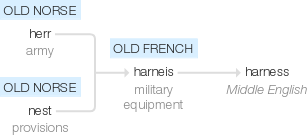Harness
Middle English: from Old French harneis ‘military equipment’, from Old Norse, from herr ‘army’ + nest ‘provisions’.
wiktionary
From Middle English harneys, harnes, harneis, harnais, herneis, from Anglo-Norman harneis and Old French hernois(“equipment used in battle”), believed to be from Old Norse *hernest, from Old Norse heer(“army”) + nest(“provisions”). More at harry.
etymonline
harness (n.)
c. 1300, "personal fighting equipment, body armor," also "armor or trappings of a war-horse," from Old French harnois, a noun of broad meaning: "arms, equipment; harness; male genitalia; tackle; household equipment" (12c.), of uncertain origin, perhaps from Old Norse *hernest "provisions for an army," from herr "army" (see harry (v.)) + nest "provisions" (see nostalgia). Non-military sense of "fittings for a beast of burden" is from early 14c. German Harnisch "harness, armor" is the French word, borrowed into Middle High German. The Celtic words are believed to be also from French, as are Spanish arnes, Portuguese arnez, Italian arnese. Prive harness (late 14c.) was a Middle English term for "sex organs."
harness (v.)
"to put a harness on a draught animal," c. 1300, from Old French harneschier "make ready, equip, arm," from harnois (see harness (n.)); figurative sense "to control for use as power" is from 1690s. Related: Harnessed; harnessing.
